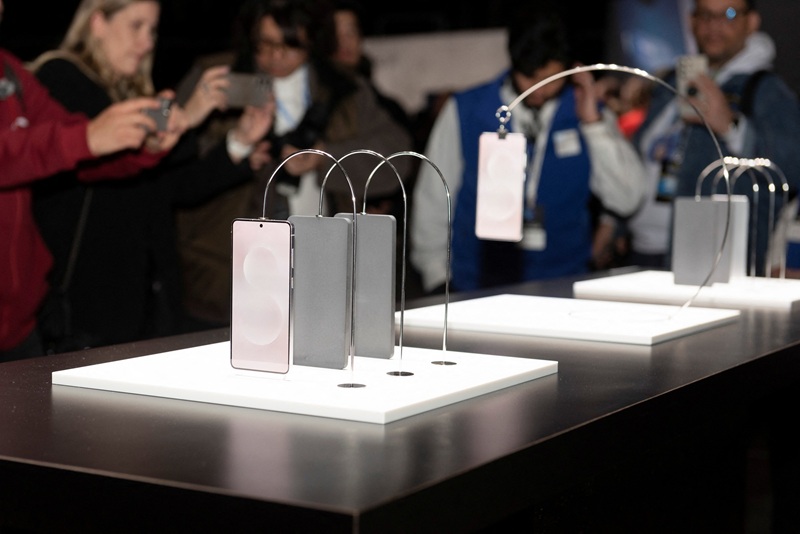
Global tech manufacturers, including Apple and Samsung Electronics, have avoided the immediate fallout from U.S. trade policy after the Trump administration excluded smartphones, PCs and other core information technology products from a sweeping reciprocal tariff scheme.
The move provides short-term relief for major firms whose manufacturing is concentrated in Asia, though further action targeting semiconductors remains a concern.
The U.S. Customs and Border Protection (CBP) on Friday announced that 20 categories of products — including smartphones, laptops, memory chips and semiconductor manufacturing equipment — would be exempt from the current reciprocal tariff regime.
Under this policy, the United States has been imposing tariffs of up to 125 percent on Chinese-made products and 10 percent on imports from other countries. The exempted goods will no longer be subject to these rates.
Apple off the hook
With 90 percent of its staple product, the iPhone, produced in China, Apple was seen as the biggest potential casualty of the proposed tariffs — and is now viewed as the biggest beneficiary of the exemption.
Analysts had warned that the combined effect of the 125 percent reciprocal tariff and an additional 20 percent fentanyl-related surcharge could more than double the price of iPhones in the U.S. market.
Relocating Apple’s supply chain to the United States is not a realistic near-term option.
“The reality is it would take three years and $30 billion dollars in our estimation to move even 10 percent of its supply chain from Asia to the U.S. with major disruption in the process,” noted Dan Ives, an analyst at Wedbush Securities.
The tariff exemption signals a retreat from Trump’s earlier hard-line position that there would be “no exceptions,” amid growing concern that blanket tariffs could stoke inflation for American consumers.
It remains unclear whether the 20 percent penalty tied to China’s fentanyl precursor exports — dubbed the “zombie drug” tariff — will also be lifted for affected products.
A sigh of relief for Samsung
Samsung Electronics is also poised to benefit. The company produces 40 to 50 percent of its smartphones in Vietnam — a country subject to a 46 percent reciprocal tariff under the previous policy.
Although reciprocal tariffs for non-China countries have been paused for 90 days, full implementation could have forced Samsung Electronics to raise consumer prices.
The company’s PCs are also primarily produced in Vietnam, and these products will receive the same exemption under the updated policy.
The tariff relief is especially welcome in the semiconductor industry, where fears had mounted that tariffs on end-user devices like smartphones and laptops would slash global demand — and by extension, depress the DRAM and NAND memory markets. With the price shock risk now reduced, those concerns may ease.
![U.S. President Donald Trump on Oct. 19, 2024 [REUTERS]](https://koreajoongangdaily.joins.com/data/photo/2025/04/13/6feb7d8e-1b60-414f-a34b-0fa6d3297e31.jpg)
Still not over
Some Korean analysts have expressed regret that Apple avoided the tariff hit.
Should Apple have been hit with the 145 percent tariff, then Samsung Electronics would have gained the relative upper hand in smartphone prices, according to market insiders.
“Even with a 46 percent tariff, Korean firms were relatively better positioned in the short term, but the U.S. government caved to domestic corporate pressure and allowed Apple to dodge the tariff blow,” said Jang Sang-sik, a researcher at the Korea International Trade Association.
And relief may only be temporary.
![An attendee holds a paddle sign with an image depicting Donald Trump as they attend his ″Make America Great Again″ rally in Latrobe, Pennsylvania, on Oct. 19, 2024. [REUTERS]](https://koreajoongangdaily.joins.com/data/photo/2025/04/13/e6340d3e-a966-4ce5-8f4a-889e1272de2f.jpg)
According to The Wall Street Journal, the White House is preparing to release the findings of a Section 232 investigation into semiconductor imports, which could result in new tariffs.
Under Section 232 of the Trade Expansion Act, the U.S. president can impose trade restrictions on goods deemed a threat to national security.
Trump previously invoked the same statute to impose 25 percent tariffs on steel and aluminum imports. The Wall Street Journal report suggested that even products exempted in this round could be impacted in the near future, keeping industry players on edge.
BY YI WOO-LIM [yoon.soyeon@joongang.co.kr]




